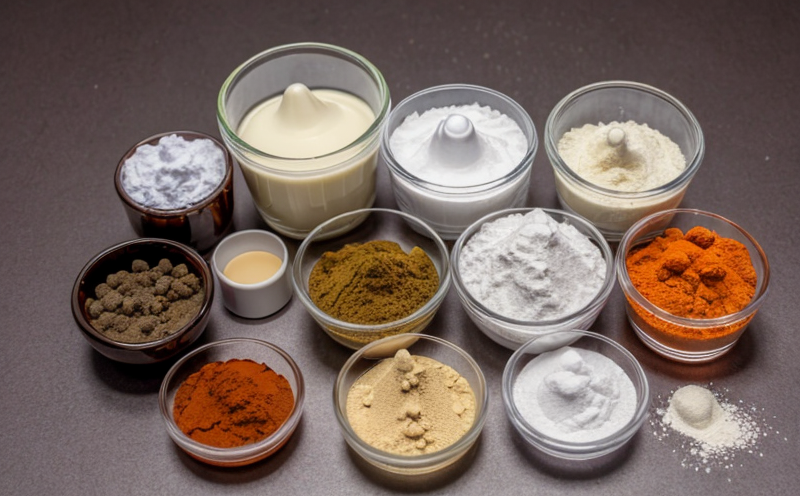ICH Q1A Accelerated Stability Testing
The ICH Q1A Guideline on Absolute and Relative Stability of New Drug Substances and Excipients is a cornerstone in the pharmaceutical industry, designed to ensure that drug products remain stable under accelerated conditions. This testing method aims to provide data for determining shelf life by subjecting new drug substances (NDS) and excipients to high temperature, humidity, or both. The primary objective is to accelerate potential degradation reactions to shorten the time required to predict long-term stability.
The ICH Q1A guideline specifies that accelerated testing should be conducted at temperatures ranging from 40°C to 60°C with relative humidity between 75% and 85%. This rigorous approach allows for a comprehensive evaluation of how excipients behave under extreme conditions, which helps in ensuring the safety and efficacy of drug formulations. The test typically takes three months but can be extended if necessary.
During this period, stability is assessed through various physical and chemical parameters. These include, but are not limited to:
- Appearance: Color changes or other visual alterations
- Pharmacological Activity: Bioassay results indicating any loss of efficacy
- Chemical Composition: Analysis by HPLC (High Performance Liquid Chromatography) and ICP-MS (Inductively Coupled Plasma Mass Spectrometry)
- Bioavailability: Determination of absorption rates in human subjects or cell culture models
The results from these tests are crucial for regulatory submissions, particularly when seeking approval from the US FDA, EMA, and other global health authorities. Compliance with ICH Q1A ensures that manufacturers meet stringent quality assurance standards, thereby protecting public health.
Accurate and reliable data generated through accelerated stability testing is essential for:
- Supporting the development of robust formulations
- Facilitating regulatory compliance
- Aiding in the optimization of production processes
- Maintaining product consistency over time
The process involves a meticulous approach to specimen preparation, which includes ensuring that the excipients are homogeneous and representative of the final drug product. This step is critical as it ensures that any observed changes are attributed accurately to the excipient itself rather than variations in the formulation.
Instrumentation plays a pivotal role in this testing process. Advanced analytical techniques such as HPLC, ICP-MS, and other spectroscopic methods are employed to monitor subtle changes in chemical composition and structure. These tools provide precise measurements that help in understanding the degradation pathways of excipients under accelerated conditions.
The data generated from these tests is then compiled into detailed reports that outline the stability profile of the excipient or formulation ingredient. Compliance officers rely on these reports to ensure ongoing compliance with regulatory requirements. Quality managers use this information to make informed decisions about process improvements and product quality assurance.
By adhering to ICH Q1A guidelines, pharmaceutical companies can enhance their reputation for producing high-quality, safe, and effective drugs. This is particularly important in today's competitive market where consumer trust is paramount. The rigorous testing regimen helps build confidence among regulatory bodies, healthcare professionals, and the general public.
It’s worth noting that while ICH Q1A focuses on excipients, its principles can be applied to other components of drug formulations as well. This versatility makes it a valuable tool across various sectors within the pharmaceutical industry.
Benefits
Adopting accelerated stability testing brings numerous benefits to pharmaceutical manufacturers:
- Rapid Identification of Stability Issues: By simulating long-term storage conditions, issues can be identified early in the development process.
- Enhanced Regulatory Compliance: Meeting ICH guidelines ensures that your products meet international standards, facilitating smoother regulatory approvals.
- Improved Product Quality: Identifying and addressing stability concerns helps maintain product quality over its shelf life.
- Cost Savings: Early identification of potential problems can prevent costly rework or recalls later in the development cycle.
- Informed Decision-Making: Detailed data allows for better decisions regarding formulation optimization, process improvements, and packaging design.
- Patient Safety: Ensuring stability under all conditions minimizes the risk of adverse effects on patients.
By leveraging ICH Q1A testing, companies not only meet regulatory expectations but also enhance their competitive edge in an increasingly regulated industry. The insights gained from this testing process contribute significantly to maintaining high standards of product quality and safety.
Why Choose This Test
Selecting ICH Q1A accelerated stability testing is a strategic decision that offers several advantages:
- Comprehensive Evaluation: The test provides detailed insights into the behavior of excipients under extreme conditions, ensuring robust formulations.
- International Acceptance: Compliance with ICH guidelines ensures widespread acceptance by regulatory bodies worldwide.
- Scientific Rigor: Utilizing advanced analytical techniques offers precise and reliable data for decision-making.
- Cost-Effective: Early identification of stability issues saves on potential rework or recalls, reducing overall costs.
- Industry Best Practice: Following ICH Q1A is a recognized industry standard that enhances reputation and trust among stakeholders.
The rigorous nature of this testing ensures that only the highest quality excipients make it to market. This commitment to excellence reflects positively on your company’s brand and contributes to long-term success in the pharmaceutical sector.
International Acceptance and Recognition
The ICH Q1A Guideline is widely recognized and accepted by regulatory authorities across the globe, including:
- United States Food and Drug Administration (FDA): FDA explicitly recommends compliance with ICH guidelines for drug development.
- European Medicines Agency (EMA): The EMA also emphasizes adherence to ICH standards as part of its quality assurance framework.
- World Health Organization (WHO): WHO supports the use of ICH Q1A in ensuring global health and safety.
Compliance with these guidelines not only simplifies regulatory submissions but also enhances your product’s marketability. Regulatory bodies appreciate the thoroughness and consistency that ICH Q1A provides, making it a preferred choice among pharmaceutical manufacturers worldwide.
The widespread acceptance of ICH Q1A underscores its significance in the industry. By adhering to these guidelines, companies demonstrate their commitment to excellence, thereby gaining credibility and trust from all stakeholders involved in drug development and production.





